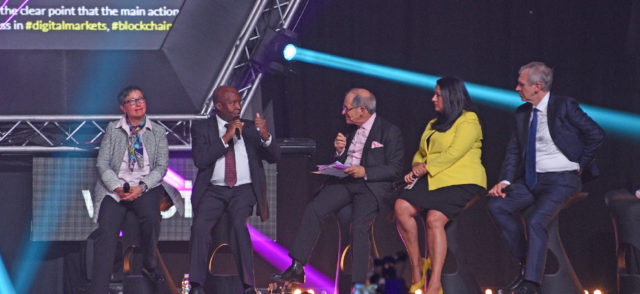Ralph Simon, who came to Bulgaria for the first time in 2018 after having been a long time friend of Webit is an amazing speaker, professionalist and visionary.
Ralph was the moderator of the panel named Digital Identity and the Future of democracy where several main point were tackled from different perspectives:
On the one hand, the Bulgarian Minister of the EU Presidency, Ms Lilyana Pavlova and the former Belgium Prime Minister, now Secretary-General of IDEA expressed strong points re: challenges and opportunities for the democracy, and on the other hand, Ms Monique Morrow, former CTO of Cisco and now founder and CEO of The Humanized Internet along with Mr Yonov Agah, a Deputy Director-General of the WTO (World Trade Organization) and responsible for the Doha Round as Chief Negotiator saw the citizens as driving force for change in democracy.
When we’re looking at the question of democracy in the digital age, it’s essential for the politicians to ask themselves and to be asked:
Ho do we run a government when each citizen is digitalized?
Minister Pavlova sees the ever changing environment as an opportunity, rather than an threat. She says the government is closer to its citizens – which for both sides is an advantage.
From her point of view, one of the biggest challenges of the Presidency of the Council was working on digital transformation, digital skills and digital Europe as a follow up from the Estonian Presidency, the leader in digital transformation in Europe. Minister Pavlova admits that while the first steps are undertaken, there is still lot to be done when it comes to e-privacy, free flow of data, data security, е-presidency and substantial framework.
Mr Leterme’s experience shows that representative democracy is one of the challenges nowadays – where decision making has completely changed. Contrary to the verticality of the representative democracy, i.e. citizens giving confidence and trust to policy makers, today we have horizontality; Another major difference is the informal interaction between citizens and politicians. While Mr Leterme agrees there are many risks, there are much more opportunities and advantages.
Politicians are still using 19th century ideologies, 20th century tools and we still haven’t found the 21st century ways with our outdated decision-making, like the ones in a political party with all the congresses and membership conditions. What was 15-20 years ago, when I was starting my political career is long gone, as president Macron is doing now, but generally in politics there is some delay.
The whole question is how can we turn the new realities into positive change impacting new elements.
The importance of data and consumers protection came up in the conversation – the biggest companies in the world control our data and when we put trust, they mustn’t betray us, unlike Facebook which was supposed to take care of our privacy and it publicly failed.
It’s important for the governments and authorities to act, instead, we leave it too much to the initiative of the private companies to self regulate.
The GDPR may have frustrated lots of companies – some bigger, some smaller, but it’s a step towards establishing a solid ground for further regulations.
Democracy 3.0. Citizens are coming much closer together and want to have participatory interaction. They don’t want to see opacity.
All of the centralized systems we’ve trusted have been hacked. What is the real approach to tackled these issues? There’s a serious mismatch between the speedy developed world and the tools representative democracy has been using to make decisions.
We need to understand the whole agency of technology before us from a government and from a citizen perspective. We need to think what democratization looks like in the 21st century that it all happens very fast, in terms of a minute.
